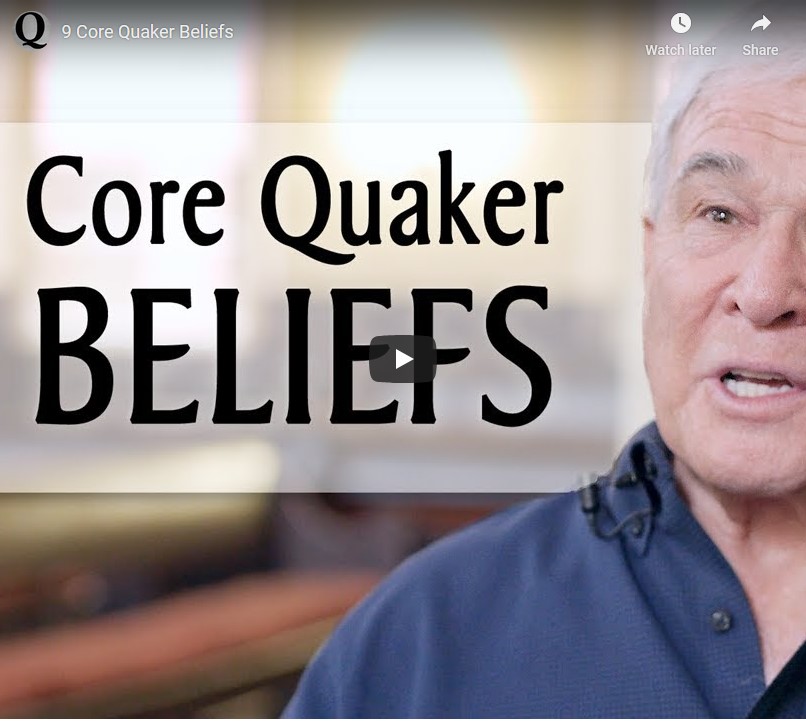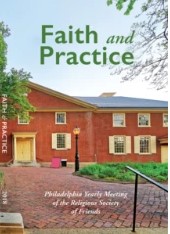What We Believe
We believe that every person is loved by the Divine Spirit. There are Quakers of all ages, religious backgrounds, races, education, sexual orientations, gender identities, and classes... You are welcome to join us as you are. - Friends General Conference's Newcomer Card
The Faith and Practice of the Religious Society of Friends (Quakers) is not defined by rules, dogma or a cooperate statement of faith.
Indeed our corporate book of Faith and Practice cites that the seeds of the historical beginnings of the Society of Friends were birthed within the English reformation of the 1500s, and with the availability of the bible to the common women and men of England. As there were increasingly divergent interpretations of scripture within the working class of England in the 1600s, those known as Seekers, and later Quakers, placed a primacy on a personal experience of the Divine Spirit.
A prime example of this is from the words of George Fox (early Quaker minister), who rose and spoke in a Church at Ulverston, saying: "You will say, Christ saith this, and the apostles say this; but what canst thou say?” (1652).
"What canst thou say" is the foundation of all Friends' belief. What does our heart know to be true about our personal relationship with the Divine?
What does one believe if one does not rotely accept rules, dogma or a cooperate statement of faith written and discerned by others? What is true, known at the very core of ones being? How do we know what we know when it is not derived by logic? The life and nourishment of the Society of Friends is an understanding that each person can, with attentiveness of mind and spirit, experience God. This experience is highly personal, named by words that are descriptive and meaningful to each person. Hence Friends have a broad descriptive language for their personal experience with the God: Living Christ, Light within, Eternal Spirit, Eternal Love and Energy, Beloved, Inward Teacher, still small voice within, that of God within, Heart of our Heart......
Faith beginning in personal revelation of the reality and relational components of the Divine leads to a remarkably diverse community. Quakers have a long history of striving to seek a sense of unity amidst the honoring of the diversity of the gathered faith community.
The honest experience of Divine love leads to (at our best) expression of love in the diversity of our community and in the world at large.
Friends have known from the very beginning that without guide posts, the temptation to shape our personal revelation of God to our own needs and desires is always near at hand. Friends have found checks on individual interpretation of Divine revelation in scripture and other devotional reading and in the testing of personal leadings by the faith community through a clearness process.
A spirit-guided life of Friends is attentive to the ongoing inward experience of the Divine and is faithful to interpreting that experience in the actions of the outward life.
Friends have, over generations and across all our expressions of the Quaker faith, come to have some common understandings or normative testimonies that illuminate these signposts. Two Friends in the 1900's have organized these ways of living in the world.
Howard Brinton, in 1943, as part of his Guide to Quaker Practice, organized the Quaker way of witnessing to the world into what has been come to be known as SPICE.
-
Four social testimonies:
-
Simplicity,
-
Peace,
-
Community,
-
Equality
-
One personal testimony:
In more recent years, a second S has been added to make the word SPICES. Friends found that a faithful life requires a commitment to proper Stewardship of all that God has given us.
Click here to see a fuller definition of each testimony and here see one Friends School interpretation of Howard Brinton's SPICES and their application.
A more recent Friend, Wilmer Cooper, organized the testimonies of all types of Quakers into:
-
Four religious testimonies:
-
direct inward experience of God,
-
enlightenment of the Light within,
-
communal experience of the spirit,
-
sacramental view of life.
-
Four social testimonies:
-
Peace,
-
Simplicity,
-
Equality,
-
Integrity
A fuller explanation of Wilmer's understanding of these testimonies can be found here.
Quakers have found that it is important to take regular times for personal and corporate reflection to evaluate the faithfulness of our lives -- the consistency of our inward to our outward testimonies. At regular intervals, Quakers consider a set of queries that are published in our book of Faith and Practice. These times of reflection often provide encouragement to continue in a particular outward manifestation (testament) of an Divine leading. And, just as important, these times of reflection can illuminate an inconsistency between faith and practice that will need work.
What then do Quakers believe? Because the way of Quakers is a rich mixture of the personal experience and community discernment of faithful living, the best way to know is to pay attention to your own experience of both your emerging faith and its outward practice, listen to thoughts and experiences of those in your community, and explore the rich legacy of writings from the Scriptures, other devotional writings and those of the Friends who have gone before us. Allow yourself to be turned by the still small voice within towards the guiding Light that brings consistency of the inward and the outward life.
-
At regular intervals, individually and at Monthly Meeting, set aside time to consider a set of the queries published in our book of Faith and Practice.
-
Take the time to talk with Friends.
-
Watch a video or two. Click here

-
Read a book or two. Books are available to be borrowed at the Meeting House or can be purchased from a book seller. The FGC and Pendle Hill book store have a wide selection of Quaker books. Books are available in print and some in electronic media. Some good first books are:
-
Read our Faith and Practice.

But most important, take time to step aside from the every day activities, quietly still your body, mind and spirit, and listen inwardly.
Join us for worship on a Sunday morning.
All who use our
Faith and Practice are encouraged to follow the admonition from the Meeting of Elders held at Balby, England, in 1656:
Dearly beloved Friends, these things we do not lay upon you as a rule or form to walk by, but that all with the measure of the light which is pure and holy may be guided, and so in the light walking and abiding, these may be fulfilled in the Spirit—not from the letter, for the letter killeth, but the Spirit giveth life. — Elders of Balby, 1656